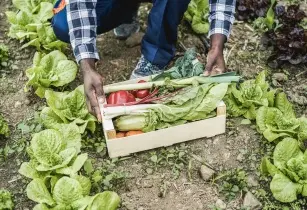Amid the triple threat of COVID-19, climate change, and fragile food systems, the Regional Strategic Analysis and Knowledge Support System (ReSAKSS) at AKADEMIYA2063, in partnership with the African Union Commission (AUC), convened the 2021 ReSAKSS Annual Conference from 15-17 November 2021
While Africa fared better than predicted, in terms of health impacts, COVID-19 has severely affected the continent’s agri-food systems and jeopardised 20 years of economic recovery, reversing years of progress in improving the livelihoods of millions of people.
The discussions focused on the impacts of the COVID-19 pandemic on African food systems and policy options to ensure recovery and strengthen resilience to future shocks. The event unveiled the 2021 Annual Trends and Outlook Report (ATOR), which provides evidence-based recommendations to guide dialogue and action towards more robust, inclusive, and resilient African food systems.
A multi-sectoral approach for sustainable impact
Dr Ousmane Badiane, AKADEMIYA2063 executive chairperson said, “The 2021 ReSAKSS Annual Trends and Outlook Report looks at the ramifications of the COVID-19 crisis, the variety of responses, and commitments made for readiness in addressing future shocks across various sectors. We must use the resources contained in the report to guide our efforts to build back better, enhance our preparedness to confront future crises and accelerate the progress of the last 20 years.”
Spanning 13 chapters, the 2021 Annual Trends and Outlook Report (ATOR) addresses food security and agricultural trade, staple food prices, impacts of global trade disruptions on African food systems, assessing community vulnerability, economic policy responses, social protection programmes, rethinking the role of social protection in African food systems, remote sensing and machine learning for food crop production data, measuring progress toward the Malabo Declaration resilience goals, measurement of resilience capacities, community dietary patterns, consumer–food security nexus framework analysis for resilient agri-food value chains and tracking key CAADP indicators and implementation processes.
“The COVID-19 pandemic exposed the fragility of the African and global food systems,” said commissioner Josefa Sacko, AU commissioner, Department of Agriculture, Rural Development, Blue Economy and Sustainable Development (AUC-DARBE). “The pandemic clearly demonstrated multi-sectoral convergence, particularly agriculture, food security, public health, safety and employment. But it is not all doom and gloom. The pandemic has provided us with an opportunity for self-reflection to rethink our development path,” she said.
Nations with diversified export baskets less vulnerable to global trade shocks
While Africa’s global trade in staples was more moderately affected, trade in beverages, fishery products, and non-food commodities such as cotton and cut flowers saw a significant decline.
Furthermore, COVID-19 has revealed the structural vulnerabilities of food import-dependent countries, notably due to price dynamics. Research demonstrates that many markets in Western Africa experienced noticeable price increases due to the impact of lockdown restrictions on supply, even though prices were lower than expected in Southern and Eastern African markets. Complexity is further underscored from the observation that price responses to COVID-19 were highly location-specific and driven by a variety of factors, notably markets’ roles in domestic and cross-border trade.
Simulation analysis focusing on 23 African countries suggests that countries with a diversified export basket, combining agricultural, energy, and mineral products, are less adversely affected by the global trade shock. Thus, diversifying exports is a key evidence-based strategy to increase the resilience of African food systems to global shocks such as the COVID-19 pandemic.
Tracking progress on CAADP indicators
The Comprehensive Africa Agriculture Development Programme (CAADP) is a continent-wide framework for reducing poverty, food insecurity and hunger, and revitalising agriculture through increased investments. Since 2006, ReSAKSS has been the primary platform for monitoring CAADP implementation, providing data and related analytical and knowledge products to facilitate CAADP benchmarking, review, and mutual accountability processes. According to the report, COVID-19 slowed Africa’s progress toward CAADP goals, and sharply worsened existing challenges, while presenting new ones.





